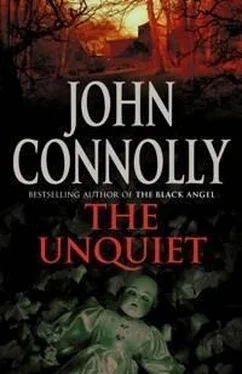Harmon nodded to one of the waiters who stood like white compass points in a circle around us, and dishes began to appear before us with quiet efficiency. There were still two empty chairs at the end of the table.
“Are we missing someone, Joel?” asked Jacobs. He had a reputation as someone who, given half a chance, would declaim endlessly about his own status as a visionary, someone who was in touch with nature and the grandeur of the ordinary man. Clearly, he’d sized up the rest of us and figured that we were going to be no competition, but he didn’t want some unknown quantity arriving and upstaging him. His beard twitched, as though something living within it had briefly shifted position, then he was distracted by the arrival of his duck terrine and commenced eating instead of wondering.
Harmon looked at the chairs, as if noticing them for the first time.
“Our children,” he said. “We had hoped that they might join us, but you know how kids are. There’s a party down at the yacht club. No offense meant to anyone here, but I think they decided that it provided more opportunities for mischief than a dinner with the folks and their guests. Now, please eat.”
It came a little late for Jacobs, who was already halfway through. To his credit, he paused awkwardly, then did a little shrug and continued working on the terrine. The food was good, although terrine of anything tended to leave me unimpressed. The main course of venison was fine, though, served as a navarin with juniper berries. There was a mousse of chocolate and lime for dessert, and coffee with petits fours to finish. The wine was a Duhard-Milon ’98, which Harmon described as costaud , or powerfully built, from one of the lesser Lafitte properties. Jacobs nodded sagely like he understood what Harmon was talking about. I sipped at my glass to be polite. It tasted a little rich for my blood, in every sense.
The conversation moved from local politics to art and, inevitably, to literature, the latter largely a result of Jacobs’s intervention, at which point he began to preen as he waited for someone to inquire about his latest magnum opus. Nobody seemed very keen to open the floodgates, but in the end Harmon asked, apparently more out of a sense of duty than any real interest. Judging from the summary that followed, Jacobs had not yet tired of mythologizing the common man, even if he had yet to get around to either understanding him or liking him.
“That man,” June whispered, as the plates were cleared and the guests began to move through a pair of double doors into a room furnished with comfortable chairs and couches, “is the most insufferable bore.”
“Someone gave me one of his books once,” I replied.
“Did you read it?”
“Started it, then figured I’d want the time back on my deathbed and I wouldn’t get it. I managed to lose the book instead. I think I dropped it in the sea.”
“A wise decision.”
Harmon appeared at my elbow.
“How about that tour, Mr. Parker? June, will you accompany us?”
June demurred. “We’ll only start fighting, Joel. I’ll let your new guest enjoy your collection without being bothered by my prejudices.”
He bowed to her, then turned back to me. “Can I offer you another drink, Mr. Parker?”
I lifted my half-finished wine. “I’m good, thank you.”
“Well, let’s proceed, then.”
We moved from room to room, Harmon pointing out pieces of which he was particularly proud. I didn’t recognize many of the names, but that was probably due more to my ignorance than anything else. I couldn’t say that much of Harmon’s collection was to my taste, though, and I could almost hear June’s expressions of dismay at some of the more outlandish additions.
“I hear you have a number of pieces by Daniel Clay,” I said, as we gazed at something that might have been a sunset or a suture.
Harmon grinned.
“June told me that you might ask after them,” he said. “I have two in a back office. Some of the others are in storage. I have a revolving collection, you might say. Too many pieces and too little space, even in a house this size.”
“Did you know him well?”
“We were at college together, and we kept in touch after graduation. He was a guest here on many occasions. I liked him a lot. He was a sensitive man. What happened was just terrible, both for him and for the children involved.”
He led me to a room at the back of the house, with high, recessed windows looking out over the sea. It was a combination of office and small library, with floor-to-ceiling oak shelves and an enormous matching desk. Harmon told me that Nyoko used it on the days when she was working in the house. There were only two paintings on the walls, one perhaps two feet by five feet, the other much smaller. The latter depicted a church steeple set against a backdrop of receding pines. It was hazy, the edges dulled, as though the whole scene was being filtered through a Vaseline-smeared lens. The larger painting showed the bodies of men and women writhing together, so that the canvas was a mass of twisting, shadowy flesh. It was startlingly unpleasant, more so because of the degree of artistry that had gone into its creation.
“I think I prefer the landscape,” I said.
“Most people do. The landscape is a later work, perhaps created two decades after the other. Both are untitled, but the larger canvas is typical of Daniel’s earlier work.”
I turned my attention back to the landscape. There was something almost familiar about the shape of the steeple.
“Is this a real place?” I asked.
“It’s Gilead,” said Harmon.
“As in the ‘children of Gilead ’?”
Harmon nodded. “Another of the dark spots on our state’s history. That’s why I keep it back here. I suppose I hold on to it more out of tribute to Daniel’s memory and the fact that he gave it to me than anything else, but it’s not something I’d want displayed in the more public areas of the house.”
The community of Gilead, named after one of the biblical cities of refuge, had been founded in the fifties by a minor timber baron named Bennett Lumley. Lumley was a God-fearing man, and he worried about the spiritual well-being of the men who worked in the forests below the Canadian border. He thought that if he could establish a town in which they and their families could live, a town without the distraction of booze and whores, then he could keep them on the straight and narrow. He instituted a building program, the most conspicuous element of which was a massive stone church designed to act as the centerpiece of the settlement, a symbol of its citizens’ devotion to the Lord. Gradually, the houses Lumley had built began to fill with timber workers and their families, some of whom were probably genuinely committed to a community based on Christian principles.
Unfortunately, not all of them felt the same way. Rumors began to emerge about Gilead, and about some of the things that went on there in the dark of night, but those were different times, and there was little that the police could do, especially as Lumley hampered any investigations, anxious to preserve the façade of his ideal community.
Then, in 1959, a hunter tracking deer through the woods near Gilead came across a shallow grave that had been partially disturbed by animals. The corpse of a newborn child was revealed: a boy, barely a day old when he died. He had been stabbed repeatedly with, it was later surmised, a knitting needle. Two other similar graves were later found nearby, each holding a small corpse, one male and one female. This time, the police arrived in force. Questions were asked; gentle and notso-gentle interrogations took place, but a number of the adults who had been living at the settlement had already fled by that stage. Three girls, one aged fourteen and two aged fifteen, were examined by doctors and found to have given birth to children in the previous twelve months. Lumley was forced to act. Meetings were convened, and influential men spoke to one another in the corners of clubs. Quietly, and without fuss, Gilead was abandoned and the buildings were either destroyed or began to fall into decay, all but the great, unfinished church, which was gradually colonized by the forest, its steeple turning to a pillar of green beneath layers of twisting ivy. Only one person was jailed in connection with what had occurred: a man named Mason Dubus, who was regarded as the senior figure in the community. He served time for child abduction and sex with a minor, after one of the girls who had given birth told police she had been a virtual prisoner of Dubus and his wife for seven years, having been taken from near her family home in West Virgina while out picking berries. Dubus’s wife escaped jail by claiming that she had been coerced into all that had occurred by her husband, and it was her evidence that helped to secure his conviction. She declined, or was unable, to tell the police anything more of what had taken place at Gilead, but it was clear from the testimony of some of the children, both male and female, that they had been subjected to continuous and sustained abuse both before and during the establishment of the Gilead settlement. It was, as Harmon had said, a dark chapter in the state’s history.
Читать дальше












